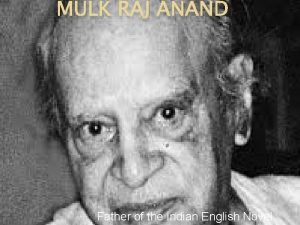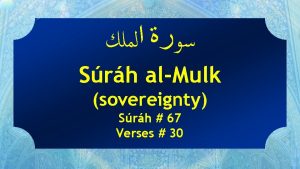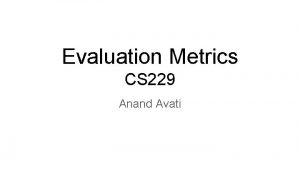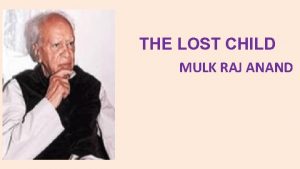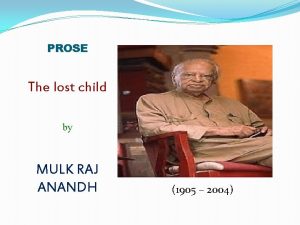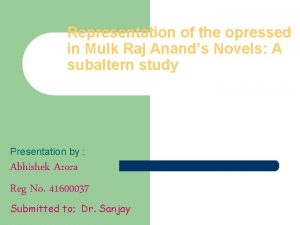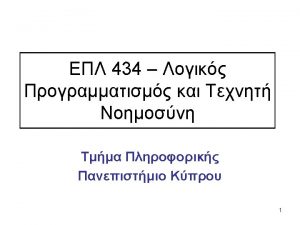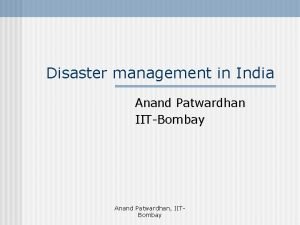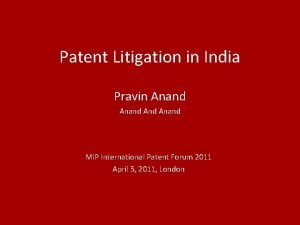MULK RAJ ANAND Father of the Indian English







- Slides: 7

MULK RAJ ANAND Father of the Indian English Novel

Brief Bionote Mulk Raj Anand was born in Peshawar in 1905 and educated at the universities of Punjab and London. After earning his Ph. D in Philosophy in 1929, Anand began writing for T. S. Eliot’s magazine Criterion as well as books on cooking and the arts. Recognition came his way with the publication of his first two novels, Untouchable and Coolie. These were followed by a succession of novels including the wellknown trilogy The Village (1939), Across the Black Waters, (1940) and The Sword and the Sickle (1942). By the time he returned to India in 1946 he was easily the best-known Indian writer abroad. Making Bombay his home and centre of activity, Anand threw himself headlong into the cultural and social life of India. He founded and edited the fine arts magazine Marg, and has been the recipient of the Sahitya Akademi Award, several honorary doctorates and other distinctions.

Major Works v v v v v Coolie (1936) Two Leaves and a Bud (1937) The Trilogy: Village, Across the Black Waters and The Sword and the Sickle The Big Heart (1945) Lament on the death of a Master of Arts (1939) Private Life of an Indian Prince(1953) Seven Summers (1951) Untouchable (19350 The Old Woman and the Cow (1960)

Anand as a Novelist Ø Major influences: Tagore, Bankim Chandra, Sharat Chandra, Prem Chand, Gandhi, Mohammad Iqbal and Bhai Vir Singh Ø Unflinching realism: Comparable with Munshi Prem Chand Charles Dickens Ø Remarkable Humanism: condemns feudalism, fascism, imperialism, caste system, exploitation and poverty Ø Champion of the Under-dog: Intolerant of injustice and inequality. Ø Against privileged classes: exposed the priests, money lenders, businessmen, teaa-planters and the colonial British Ø Autobiographical element in his novels Ø A propagandist streak in his writing

Awards & Achievements � He was honored with the Padma Bhushan, India’s third highest civilian award in 1967 for his vast contributions towards the field of Literature & Education. � He won the Sahitya Academy Award for his novel ‘The Morning Face’ (1968).

Literary style § Anand, who was associated with Communism, used his novels to make broad attacks on various elements of India's social structure and on British rule in India; they are considered important for their social statement. § Language is Indian English § Abundant use of Indianisms § Free use of English translation of Indian abusive expressions § Themes related to exploitation take precedence over aesthetics of structure and language

Some links for reference � � http: //www. ukessays. com/essays/englishliterature/the-themes-of-mulk-raj-anands-coolieenglish-literature-essay. php http: //www. ijtra. com/special-issue-view/criticalanalysis-of-protagonists-of-mulk-raj-anandsnovels. pdf http: //www. theijes. com/papers/v 2 i 4/part. %20(2)/F 0242031033. pdf http: //shodhganga. inflibnet. ac. in/bitstream/1060 3/4059/8/08_chapter%202. pdf
